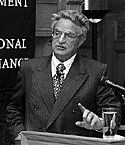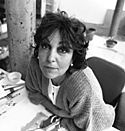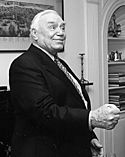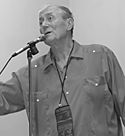
 |
||
The Yale Alumni Magazine is owned and operated by Yale Alumni Publications, Inc., a nonprofit corporation independent of Yale University. The content of the magazine and its website is the responsibility of the editors and does not necessarily reflect the views of Yale or its officers. |
“We are all disgusted with politics, but we cannot do without them,” said Hungarian-born billionaire investor and philanthropist George Soros on October 10 at the School of Management’s International Center for Finance. Soros, who received the Center’s first award for excellence, chairs the management firm that oversees investment strategy for a number of successful mutual funds. Center director William Goetzmann praised Soros as “someone who sees, understands, and articulates the relationship between finance and society.”
Donna Shalala, secretary of health and human services, delivered the Samuel Thier Lecture at the Medical School and the Harper Fellow Lecture at the School of Law on October 7. In her first address, Shalala discussed the challenges facing Medicare. At the Law School, Shalala tackled the topic of medical privacy. “A Blockbuster video card guarantees you more privacy than your health insurance card,” she noted, urging the adoption of new legislation. “In a post-industrial democracy, protection of medical histories must be sacrosanct.”
Painter Paula Rego, whose challenging work appears as part of the Center for British Art’s current “School of London” exhibition, discussed her artistic inspirations on October 18 as part of the BAC’s ongoing “Viewpoints: Artists and Collectors Speak” series. “I have frightened myself—unpleasant things come out,” says Rego, who lives in Portugal and whose studies of the human figure are influenced by the people and landscapes of that country. But she also noted that her paintings were helped along by her child. “You have to learn to play again in order to develop as an artist,” she said.
Actor Ernest Borgnine, a New Haven native and Academy Award winner, took center stage at a master’s tea in Pierson College on October 24. Borgnine, 83, recounted a career of nearly 100 films and several TV series, including a starring role in McHale’s Navy. “Acting is all about listening to your fellow man,” he explained, as he talked about working with such screen legends as Spencer Tracy, Frank Sinatra, and Sam Peckinpah. Later that evening, at an event sponsored by the Yale Film Society, Borgnine screened his newest film Hoover, in which he plays the late FBI director.
Russia’s poet laureate, Yevgeny Yevtushenko, visited Yale under a Chubb Fellowship on October 4. Expelled from the Young Communist League for his individualism in 1957, he became, in the 1960s, the first Russian poet to recite his work in the West. At the Whitney Humanities Center, the poet displayed his lyrical versatility by shifting seamlessly from the political to the romantic, claiming in an ode to Paul Robeson that “genius is always under suspicion,” and then, in a love peom, “I love you more than Shakespeare.” Close-Up: Tom Wolfe
Author Tom Wolfe ’57PhD painted a poignant picture of the lot of a graduate student when he spoke at the Law School Auditorium on October 11. Wolfe, the first speaker in the Graduate School’s Tercentennial lecture series “In the Company of Scholars,” recalled his days in a cubicle high in Sterling Memorial Library as the days turned to spring. “My only glimpse of the outside world was through one of those narrow ‘leper’s windows,’” said Wolfe. “I would see a rectangle of dazzling blue sky and the green shoots at the end of a limb, like one of those Chinese paintings on silk. The buds were bursting with procreative energy—and so was I! I was 22!” But confinement in the stacks was not Wolfe’s only memory of Yale. He credited sociology professor John Sirjamaki with awakening his interest in the science of human interaction and the then-new concept of “status” (always pronounced STAY-tus at Yale, Wolfe explained). “I arrived with the standard liberal arts student’s disdain for the social sciences,” Wolfe said. “But I couldn’t have written a book like The Right Stuff had I not become interested in [sociologist] Max Weber and status structures.” After finishing his PhD, Wolfe got a job writing obituaries for a Springfield, Massachusetts, newspaper, which led him to a career as a pioneer of “New Journalism,” turning a sociological eye on American subcultures ranging from auto racing to the space program to the New York art world. More recently, he has done similar work in fiction with his novels The Bonfire of the Vanities and A Man In Full. Whatever he picked up at Yale, Wolfe by his own admission must have acquired his lively writing style elsewhere. Of his dissertation in American studies, which was about the 1930s group the League of American Writers, Wolfe said only that “it is the driest dissertation ever written at the Graduate School.” |
||||||||||||||
|
|
|
|
|
|
|
|
©1992–2012, Yale Alumni Publications, Inc. All rights reserved. Yale Alumni Magazine, P.O. Box 1905, New Haven, CT 06509-1905, USA. yam@yale.edu |
||





